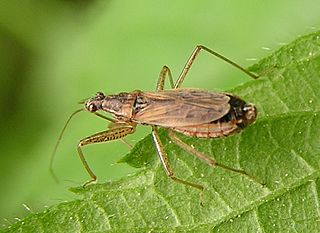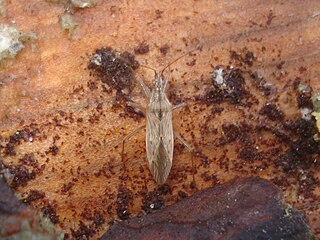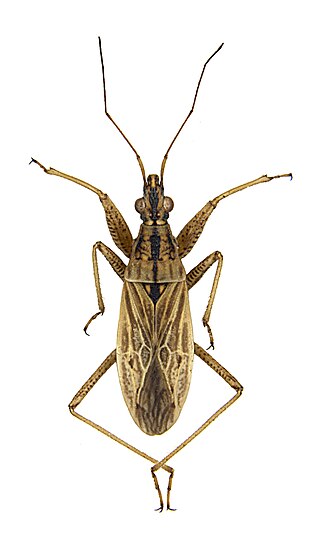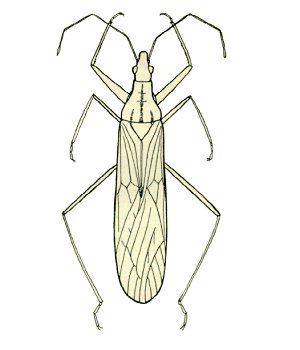
The insect family Nabidae contains the damsel bugs. There are over 500 species in 20 genera. They are soft-bodied, elongate, winged terrestrial predators. Many damsel bugs catch and hold prey with their forelegs, similar to mantids. They are considered helpful species in agriculture because of their predation on many types of crop pests.
Nabis alternatus, the western damsel bug, is a species of damsel bug in the family Nabidae. It is found in Central America and North America.
Nabis americanus is a species of damsel bug in the family Nabidae. It is found in North America.
Nabis curtipennis is a species of damsel bug in the family Nabidae. It is found in Oceania.
Nabis edax is a species of damsel bug in the family Nabidae. It is found in North America.

Nabis ferus is a species of damsel bug in the family Nabidae. It is found in Central America and Europe.
Nabis gagneorum is a species of damsel bug in the family Nabidae. It is found in Oceania.
Nabis giffardi is a species of damsel bug in the family Nabidae. It is found in Oceania.
Nabis inscriptus is a species of damsel bug in the family Nabidae. It is found in Europe and Northern Asia and North America.
Nabis kalmii is a species of damsel bug in the family Nabidae. It is found in North America.
Nabis koelensis is a species of damsel bug in the family Nabidae. It is found in Oceania.
Nabis oscillans is a species of damsel bug in the family Nabidae. It is found in Oceania.

Nabis pseudoferus is a species of damsel bug in the family Nabidae.

Nabis rugosus also known as the Common Damsel Bug is a predatory true bug. The species is found in the Palearctic. It is found in Europe from the North edge of the Mediterranean to southern Scandinavia. Further east, the distribution extends east across the Palearctic to Central Asia and Siberia. The species occurs everywhere in Central Europe and is found in the lowlands, as well as in the central uplands and in the Alps up to about 1500 meters above sea level. It is Central Europe's most common species of sickle bug and it is found in many different habitats, open, dry, shaded and moist; but it prefers moderately moist, half shady places with dominant grass. Adjacent woodland vegetation is equally important.

Amphiagrion saucium, the eastern red damsel, is a species of narrow-winged damselfly in the family Coenagrionidae. It is found in North America.

Nabis rufusculus is a species of damsel bug in the family Nabidae. It is found in North America.

Nabis roseipennis is a species of damsel bug in the family Nabidae. It is found in North America.

Lasiomerus annulatus is a species of damsel bug in the family Nabidae. It is found in North America.
Alloeorhynchus trimacula is a species of damsel bug in the family Nabidae. It is found in Central America and North America.

Nabis capsiformis, the pale damsel bug, is a species of damsel bug in the family Nabidae. It is found in Africa, the Caribbean, Europe and Northern Asia, Central America, North America, Oceania, and South America.









